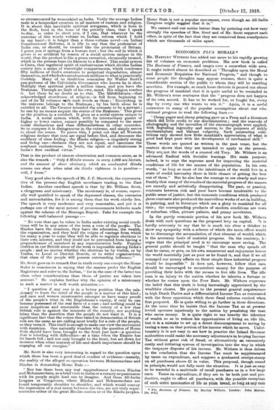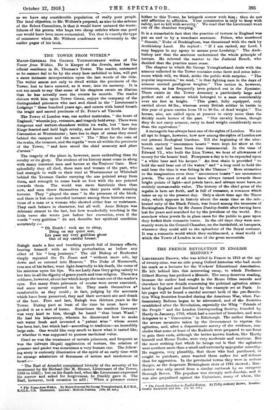ECONOMICS PL US MORALS.* HR. HARTLEY Wrrezes has added one
more to his rapidly growing, list of volumes on economic problems. His new book is called The Business of Finance, and ranges over a somewhat wide area. It might indeed almost be described as "Thoughts upon the Moral and Economic Requisites for National Progress," and though to some people the thoughts may appear truisms, there is quite a considerable section of the public to whom they will be startling novelties. For example, so much loose rhetoric is poured out about the progress of mankind that it is quite useful to be reminded in Mr. Withers's terse sentences that the "progress does not happen of its own accord. It has to be worked for, or fought' for, every day by every one who wants to win it." Again, it is a useful corrective to many of the popular assumptions about our edu- cational progress to read the following lines :— " Cheap paper and cheap printing gave us a Press and a literature which did little credit to our discrimination ; and the marvels of photography and the invention of the cinematograph were applied, with degrading ingenuity and success, to the purposes of sickly sentimentalism and blatant vulgarity. Such nauseating exhi- bitions only showed how little mankind's appreciation of what is good had kept pace with the development of mechanical skill." These words are quoted as written in the past tense, but the context shows that they are intended to apply to the present. They are, not the words of a crusted old Tory. Mr. Withers is an advanced Radical with Socialist leanings. His main purpose, indeed, is to urge the supreme need for improving the material conditions of life for the MafReS of the population. In his own words, "as long as most of the inhabitants of the world live in a state of sordid insecurity there is little chance of getting the best out of them." But he also has the courage to see clearly and state frankly that many of the results of the material progress of the masses are morally and artistically disappointing. The past, or passing, contrasts between rich and poor have become intolerable to the public sense of justice, but the economic conditions which produced those contrasts also produced tho marvellous works of art in building, in painting, and in literature which are a glory to mankind for all time ; the corresponding products of modern conditions are rows of suburban villas, picture palaces, and penny novelettes.
. In the purely economic portion of his new book Mr. Withers deals with such questions as the proposed levy on capital. It is hardly necessary to say that he is much too clear a thinker to show any sympathy with a scheme of which the main effect would be to discourage the accumulation of that element of wealth which is the necessary basis of material progress. On the contrary, In urges that the principal need is to encourage more saving. The general public should be taught "that the man who spends all that he earns, or gets, on his own amusement and enjoyment leaves the world materially just as poor as he found it, and that if we all managed our money affairs on these simple lines industrial progress would be impossible." It does not, however, follow that men should be encouraged to accumulate money for the purpose of providing their heirs with the means to live idle lives. The idle man is an injury to the nation whether he inherits a fortune or whether he comes upon the Poor Rate. Mr. Withers expresses the belief that this truth is being increasingly appreciated by the wealthier classes. He points to the present general acquiescence in high Death Duties and a differentiated Income Tax as contrasted with the fierce opposition which these fiscal reforms excited when first proposed. He is quite willing to go further in these directions. At the same time he insists that the Income Tax as at present levied operates injuriously to the nation by penalizing the man who saves money. It ie. quite right to tax heavily the inheritor of wealth so as to reduce his opportunities of living an idle life, but it is a mistake to set up a direct discouragement to saving by taxing a man on that portion of his income which he saves. Unfor- tunately it is not easy to see how in practice the Inland Revenue authorities could make the necessary adjuatanents in levying Income Tax without great risk of fraud, or alternatively an excessively costly and irritating system of investigation into the way in which the taxpayer disposes of his income. Mr. Withers is thus driven to the conclusion that the Income Tax must be supplemented by taxes on expenditure, and suggests a graduated receipt-stamp on all purchases above II in value. This proposal, though sound in principle, would not fully meet the situation. It is just as easy to be wasteful in a multitude of small purchases as in a few large ones. Taxes on expenditure, if they are to be both just and pro- ductive, ought to affect all purchases, with the possible exception of such strict necessaries of life as plain bread, so long at any rats
• The Business of Finance. By Haxtley Withers. London : John Murray. [Os. neta
as we have any considerable population of really poor people. The fatal objection to Mr. Withers's proposal, OA also to the scheme of the Select Committee, is that it would leave untaxed the waste- fulness of the person who buys two cheap articles where one good one would have been more economical. Yet that is exactly the type of commerce which Mr. Withers condemns so vehemently in the earlier pages of his book.



































 Previous page
Previous page